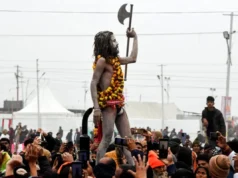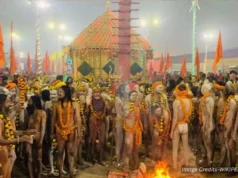Kumbh Mela is a major spiritual event in India, held at four sacred locations — Prayag, Haridwar, Nashik, and Ujjain. Rooted in Hindu mythology, it attracts millions of devotees who believe that taking a holy dip in the rivers cleanses their sins and brings spiritual renewal.The festival features grand processions, Naga Sadhus’ rituals, and vibrant cultural activities, making it a profound experience for all participants.
Kumbh Mela is one of the largest spiritual gatherings on Earth. It takes place at four sacred locations in India — Prayag (Allahabad), Haridwar, Nashik-Trimbakeshwar, and Ujjain.
Millions of devotees, saints, and seekers come together to take a holy dip in the rivers, believing it will cleanse their sins and lead to salvation.
Mythological Origins
The story of Kumbh Mela is linked to the Samudra Manthan — the “Churning of the Ocean” from Hindu mythology. Gods (Devas) and demons (Asuras) churned the ocean to extract Amrita, the nectar of immortality.
The Process of Churning
- Mandrachala Mountain acted as the churning stick.
- Vasuki, the serpent, served as the rope.
- Lord Vishnu, in his Kurma (tortoise) avatar, supported the mountain.
The process symbolizes self-reflection and inner transformation, leading the soul toward liberation.
Key Events of the Churning
1. Shiva Drinks the Poison
Before Amrita appeared, a deadly poison surfaced. Lord Shiva consumed it to save the universe, earning the title Neelkantha.
2. Journey of the Nectar
When Amrita appeared, Jayanta, the son of Lord Indra, seized it to protect it from the demons. During a 12-year divine chase, drops of nectar fell at four earthly locations: Haridwar, Prayag (Allahabad), Nashik-Trimbakeshwar, and Ujjain.
These places became sacred and now host the Kumbh Mela.
Astrological Significance
The timing of Kumbh Mela is determined by the positions of celestial bodies, mainly Jupiter, the Sun, and the Moon. The celebration at each site is based on a distinct set of astronomical positions.
- Haridwar: The Mela is celebrated when Jupiter is in Aquarius and the Sun is in Aries.
- Prayag (Prayagraj): It occurs when Jupiter is in Taurus and the Sun is in Capricorn.
- Nashik-Trimbakeshwar: It is held when Jupiter is in Leo.
- Ujjain: It is held when both Jupiter sits in Leo and the Sun moves into Aries.
The 12-year cycle of Jupiter’s zodiac journey decides when and where each Kumbh Mela will occur.
Types of Kumbh Mela
- Normal Kumbh: Held every 3 years.
- Ardh Kumbh: Held every 6 years at Prayag and Haridwar.
- Purna Kumbh: Held every 12 years at all four locations.
- Maha Kumbh: Celebrated every 144 years at Prayag — the rarest of all, occurring after 12 Purna Kumbh cycles.
Key Highlights of the Festival
Peshwai Procession
The grand arrival of Akharas marked by elephants, horses, drums, and flags — symbolizing the beginning of the sacred event.
Shahi Snaan (Royal Bath)
The most important ritual of the Mela, where Naga Sadhus and saints take the first holy dip, setting the tone for the festival. Pilgrims believe that taking a holy dip during this auspicious time washes away sins and grants moksha (liberation).
Cultural and Spiritual Activities
Ceremonies, devotional music, meditation camps, and discourses on spiritual philosophy fill the air with divine energy and unity.
Who Attends the Kumbh Mela?
The festival draws a diverse spiritual community:
- Sadhus: Saints devoted to meditation and renunciation.
- Naga Sadhus: Ascetics known for their fierce devotion and unique rituals.
- Hermits: Emerging from isolation to share wisdom and blessings.
- Pilgrims: Devotees seeking purification, faith, and spiritual awakening.
Why Millions Attend
For many, Kumbh Mela is a once-in-a-lifetime pilgrimage. It is believed that taking a holy dip during the auspicious alignments washes away sins and grants moksha (liberation).
Beyond religious rituals, the Kumbh Mela also showcases India’s unity in diversity — where philosophy, art, and spirituality meet in one grand celebration.
A Living Heritage
Kumbh Mela is more than a festival — it is a living embodiment of India’s ancient wisdom.
Recognized by UNESCO as an Intangible Cultural Heritage of Humanity in 2017, it continues to inspire millions with its message of purity, harmony, and universal brotherhood.
FAQs About Kumbh Mela
1. What is Kumbh Mela and why is it celebrated?
Kumbh Mela is a Hindu pilgrimage where devotees gather at sacred rivers to take a holy dip believed to cleanse sins and bring spiritual liberation. It celebrates the divine event of Samudra Manthan when nectar fell at four sacred places.
2. Where is Kumbh Mela held?
The Mela rotates among four holy cities: Prayag (Allahabad), Haridwar, Nashik-Trimbakeshwar, and Ujjain.
3. How often does Kumbh Mela occur?
The major Kumbh (Purna Kumbh) happens every 12 years, while Ardh Kumbh takes place every 6 years at Haridwar and Prayag.
4. What is the spiritual importance of taking the holy dip?
The dip symbolizes inner purification — freeing the soul from past karma and guiding one toward salvation (moksha).
5. What is the difference between Ardh Kumbh, Purna Kumbh, and Maha Kumbh?
- Ardh Kumbh: Every 6 years (Haridwar & Prayag)
- Purna Kumbh: Every 12 years (all four sites)
- Maha Kumbh: Once in 144 years at Prayag
6. Is Kumbh Mela recognized internationally?
Yes. In 2017, UNESCO recognized Kumbh Mela as an Intangible Cultural Heritage of Humanity.
Kumbh Mela continues to stand as a bridge between faith and eternity — a timeless celebration of devotion, unity, and divine consciousness.
For the latest updates on Ancient History, cultural insights, and spiritual journeys, visit simhasthakumbhmela.com.
Discover more about the ascetic orders in our guide: [The Secrets of Naga Sadhus Explained]
Share your thoughts and stories in the comments below!







